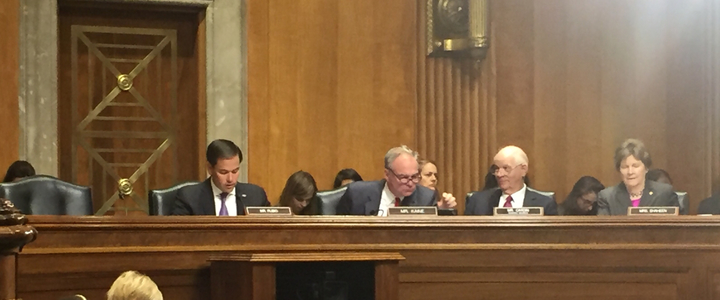WASHINGTON — Security threats, lack of infrastructure and local political tensions have prevented religious and ethnic minorities in Iraq from moving back to territories that have been liberated from ISIS, several Middle East experts said Wednesday.
Denise Natali, director of the Center for Strategic Research at the Institute for National Strategic Studies, told a Senate Foreign Relations Committee hearing that reports indicate only about 20,000 of the 200,000 Assyrians from the Ninawah Plains have returned to their homes. Assyrians generally are Syraic Christians; ancient Assyria included parts of Iraq.
Former Republican Rep. Frank Wolf, who now is part of the religious freedom advocacy group 21st Century Wilberforce Initiative, said he recently was in Iraq and found that Iraqi minorities do not trust the country’s security forces. They would like to see American and NATO forces “training of some of the national guard,” he said.
Wolf criticized the United Nations efforts to reach minority groups, especially Iraqi Christians seeking aid. He testified that Iraqi “Christians are afraid to go into the U.N. run camps” because ISIS sympathizers are in those camps.
He suggested that the U.S. provide funds to other organizations, such as Knights of Columbus, willing to reach out to Christian minorities. He also urged the senators to support the creation of new federal position to ensure that the U.S. is ensuring the safety of religious minorities in Iraq.
But the physical barriers stopping religious and ethnic minorities from return to the ISIS-controlled areas are also significant, experts said. Schools, hospitals and other infrastructures were destroyed when the territories were under ISIS control.
“Even if their own homes might be standing, there’s nothing else in place for them to be able to live comfortably,” Sahar Khan, a research fellow at the libertarian Cato Institute, She noted that “internal tension” over the Kurdistan referendum in which a majority of Iraqi Kurds voted in a non-binding election to separate from Iraq would make it even harder for Iraqi government to rebuild the communities.
Power struggles between the Iraqi government and Kurdish regional government over territorial ownerships have also contributed to the difficulties minorities face, Natali said.
Natali advocated for the U.S. to mediate a negotiation between the Iraqi government and the Kurdistan regional government.

